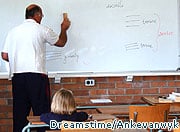Secularism isn’t a value neutral force in education and attempts to exclude faith from the classroom risk anti-religious indoctrination, according to a new report by a professor of education.
Prof Trevor Cooling’s report, entitled Doing God in Education, also criticised opponents who claim that faith schools shouldn’t be able to consider religious criteria when selecting pupils.
The report, published by the theology think-tank Theos, argues that all education is value driven and shaped by school leaders.
Privilege
It cautions: “The objection to so-called neutral approaches, then, is that they privilege secular worldviews and are in danger of implicit anti-religious indoctrination.
“They are not, in other words, neutral.”
Commenting on the report Paul Woolley, the think-tank’s director, said: “The idea that education is religiously neutral or objective is indefensible.
Faith
“Teaching is shaped by our understanding of which virtues we should practise, what qualities we should value, ultimately of what kind of people we should be.”
The report also dismissed critics of faith-based admissions, saying: “The opposition to selection in faith schools is based on the assumption that religion is an irrelevant criterion.
“But it has been argued throughout this report that this assumption that religion is clutter is wrong in its portrayal of the nature of human knowledge, ideological in its dependence on humanist beliefs and probably anti-religious in its negative view of faith.
Unfair
“To utilise it as the defining feature for the charge of discrimination is, therefore, itself unfair and exclusive.”
The report’s findings were welcomed by Prof Leslie J Francis from the University of Warwick who said: “Trevor Cooling nails the absurdity and illogicality of the secularist position that tries to silence religious voices in the educational arena.”
Earlier this month it emerged that faith schools had dominated a league table of the best performing primary schools in England once again.
Primary
The official tables, composed by the Department for Education, show that nearly two thirds of the best primary schools are Anglican, Roman Catholic or Jewish.
The success of faith-based primaries comes despite the fact that they account for just one in three schools nationally.
Barbara Jarrett, head of the country’s top-performing faith-based primary, said: “It’s all about shared values. We expect our children to be respectful, care for each other, be committed and hard working. Our values reflect the values of our church.
Respectful
“And we encourage children to have a love of learning and a belief in their own ability to do well.”
Mrs Jarrett, who heads St Wilfrid’s Catholic Primary in Sheffield, added: “There is a real crisis in our education system today, we call on the Government to learn lessons from faith schools.”
This year’s league table revealed that 289 schools in England gained “perfect” results by ensuring that all of their pupils met the standards expected for their age group. Of these schools 61 per cent were faith schools.
Sprinkled
In 2008 Revd Ainsworth defended faith schools saying: “Some seem to believe that the Christian ethos, which is so valued by parents, is like a sort of magic dust that is sprinkled on church schools simply by association.
“But it is, in fact, achieved through the hard work of staff and governors in building a learning community that is underpinned with Christian values.”

